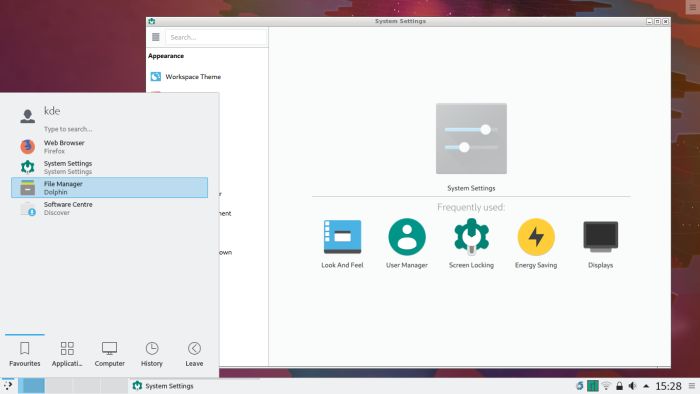Last Updated on July 6, 2021
Plasma is the KDE workspace. It’s a common framework for creating integrated interfaces. It’s flexible enough to provide interfaces for mobile devices (phones and netbooks), media centres and desktop computers.
Plasma supports widgets written specifically for Plasma (also known as Plasmoids) as well as widgets from other sources such as Google Gadgets, Superkaramba and some Dashboard Widgets from Mac OSX.
There are two varieties of Plasma: The Plasma Desktop environment and Plasma Mobile, the new cool environment for pads and smartphone.
Features include:
- Four components:
- Panel – provides room for the application launcher, the list of windows (programs), clock and system tray. Panels allow you to place widgets around the edges of the screen. These collections of widgets can be configured in various ways, including making them automatically hide when not in use or aligned to certain areas of the screen.
- Desktop – the area where widgets and icons reside.
- Folder view – a widget that lists the content of a folder on your computer.
- Plasma toolbox – used to access configuration and other options quickly and reliably.
- Built on widgets, allowing you to move, mix, add, and remove just about everything.
- Online Accounts – integrate many services such as Skype, Telegram, Twitter, Google, and others.
- KDE Connect – ties your Android devices to the KDE desktop. This offers, among other things, the ability to send and receive text messages out of sight of your phone.
- KDE’s Dolphin file manager is feature-laden. Besides standard file management functions, it can encrypt files, burn files to optical media, extract archives, and more.
- KRunner – a mini-command line that can search for applications, bookmarks, even sessions basing on your input, show system activity and even do simple arithmetic calculations. There’s Web shortcuts which works together with KRunner.
- Integrated features.
- Accessibility – control all aspects of the desktop from the keyboard.
Website: www.kde.org/plasma-desktop
Support: Wiki, Planet KDE
Developer: KDE
License: GNU Lesser General Public License

Return to Desktop Environments Home Page
| Popular series | |
|---|---|
| The largest compilation of the best free and open source software in the universe. Each article is supplied with a legendary ratings chart helping you to make informed decisions. | |
| Hundreds of in-depth reviews offering our unbiased and expert opinion on software. We offer helpful and impartial information. | |
| The Big List of Active Linux Distros is a large compilation of actively developed Linux distributions. | |
| Replace proprietary software with open source alternatives: Google, Microsoft, Apple, Adobe, IBM, Autodesk, Oracle, Atlassian, Corel, Cisco, Intuit, SAS, Progress, Salesforce, and Citrix | |
| Awesome Free Linux Games Tools showcases a series of tools that making gaming on Linux a more pleasurable experience. This is a new series. | |
| Machine Learning explores practical applications of machine learning and deep learning from a Linux perspective. We've written reviews of more than 40 self-hosted apps. All are free and open source. | |
| New to Linux? Read our Linux for Starters series. We start right at the basics and teach you everything you need to know to get started with Linux. | |
| Alternatives to popular CLI tools showcases essential tools that are modern replacements for core Linux utilities. | |
| Essential Linux system tools focuses on small, indispensable utilities, useful for system administrators as well as regular users. | |
| Linux utilities to maximise your productivity. Small, indispensable tools, useful for anyone running a Linux machine. | |
| Surveys popular streaming services from a Linux perspective: Amazon Music Unlimited, Myuzi, Spotify, Deezer, Tidal. | |
| Saving Money with Linux looks at how you can reduce your energy bills running Linux. | |
| Home computers became commonplace in the 1980s. Emulate home computers including the Commodore 64, Amiga, Atari ST, ZX81, Amstrad CPC, and ZX Spectrum. | |
| Now and Then examines how promising open source software fared over the years. It can be a bumpy ride. | |
| Linux at Home looks at a range of home activities where Linux can play its part, making the most of our time at home, keeping active and engaged. | |
| Linux Candy reveals the lighter side of Linux. Have some fun and escape from the daily drudgery. | |
| Getting Started with Docker helps you master Docker, a set of platform as a service products that delivers software in packages called containers. | |
| Best Free Android Apps. We showcase free Android apps that are definitely worth downloading. There's a strict eligibility criteria for inclusion in this series. | |
| These best free books accelerate your learning of every programming language. Learn a new language today! | |
| These free tutorials offer the perfect tonic to our free programming books series. | |
| Linux Around The World showcases usergroups that are relevant to Linux enthusiasts. Great ways to meet up with fellow enthusiasts. | |
| Stars and Stripes is an occasional series looking at the impact of Linux in the USA. | |